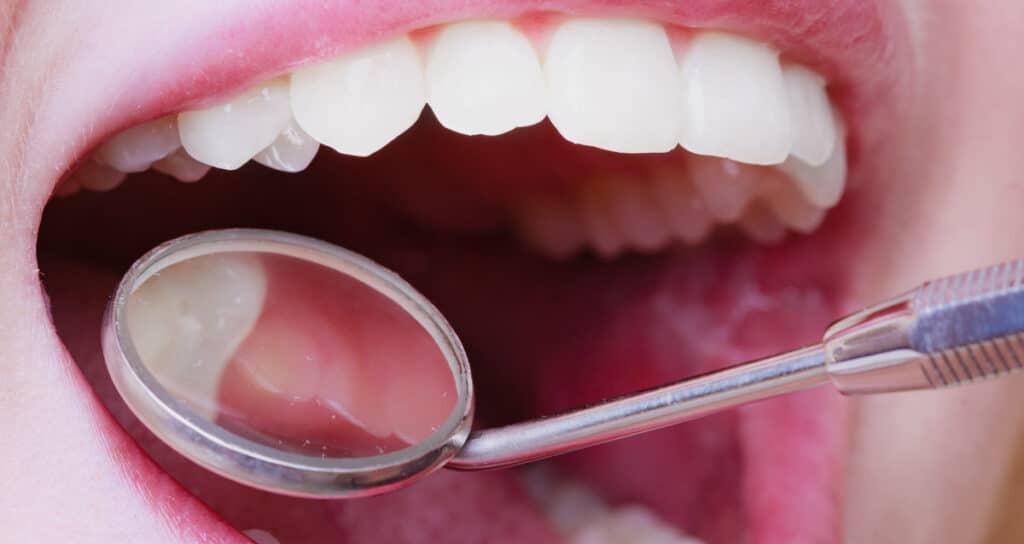A cavity in a front tooth can be both painful and worrying, especially since front teeth are so visible when we smile or speak.
Tooth decay affects people of all ages and can happen to any tooth, but cavities in front teeth may cause particular concern because they can affect your appearance as well as your oral health. Understanding the causes of decay, recognising the symptoms, and knowing the best treatment options available will help you take action early and prevent further damage.
Here’s everything you need to know about cavities in front teeth, from diagnosis to the most effective dental treatments.
What causes cavities in front teeth?
A cavity in front tooth is caused by tooth decay, which happens when the enamel, the hard outer layer of the tooth, is broken down by acids produced by bacteria in the mouth. These bacteria feed on sugary foods and drinks left on your teeth after eating and produce acids that attack the enamel.
Unlike the chewing surface of back teeth, front teeth usually have a smoother surface, but they can still develop cavities, especially near the gum line or between teeth. Poor oral hygiene, irregular brushing, and not visiting the dentist regularly can increase the risk of decay in front teeth.
Why front teeth cavities need special attention
Cavities in front teeth should be treated quickly because these teeth help you speak and bite properly. If the decay isn’t treated, it can lead to pain, infection, or even losing the tooth. Front teeth also have a thinner layer of enamel than back teeth, so they can get damaged more easily.
These teeth are also the most visible when you talk or smile. If they don’t look right, it can affect your confidence and how you feel around others. Treatment is not just about fixing the cavity, but also about making the tooth look natural again so you can feel good about your smile.

Diagnosing a cavity in the front tooth
Common symptoms to look out for
Symptoms of a cavity in front tooth may include tooth sensitivity to hot, cold, or sweet foods, pain when biting or chewing, visible brown or white spots on the tooth surface, or a hole or pit that you can see or feel with your tongue. Some people may experience no symptoms at first, which is why regular dental check-ups are essential to detect early decay.
How dentists examine front tooth cavities
When you see a dentist for a suspected cavity, they will visually inspect your mouth and may use dental instruments to check for soft spots or holes in the enamel. X-rays may be taken to see the extent of the decay beneath the surface or between teeth. Dentists also assess the overall oral hygiene and check for plaque and tartar build-up, which contribute to cavities.
Preventative measures before treatment
Daily oral hygiene tips for front teeth
To prevent cavities from developing or worsening, it is important to maintain good oral hygiene. Brush your teeth twice a day with fluoride toothpaste, making sure to clean all surfaces of your front teeth thoroughly. Use a soft-bristled toothbrush to avoid damaging the enamel or gums. Floss daily to remove plaque and food particles between teeth where a toothbrush cannot reach.
Dietary changes to reduce cavity risk
Sugary foods and drinks are a major cause of tooth decay. Limiting the amount and frequency of sugary snacks, sweets, and fizzy drinks can help keep plaque and bacteria away from your teeth. Drinking plenty of water throughout the day helps rinse away food debris and maintains saliva flow, which naturally protects enamel. If you do consume sugary foods or drinks, try to brush your teeth soon after or at least rinse your mouth with water.

Traditional filling options
Composite resin fillings: a popular choice
When a cavity has developed in a front tooth, composite resin fillings are usually the best option. These fillings are tooth coloured, meaning they blend in with the natural colour of your front teeth, providing an aesthetic result. Composite resin is bonded directly to the enamel and dentine layers of the tooth, restoring both appearance and function.
Advantages and disadvantages of amalgam fillings
Amalgam fillings, made from a mixture of metals, are more commonly used for back teeth because of their durability on chewing surfaces. However, they are silver in colour and may not be suitable for front teeth where appearance matters. Although amalgam is long-lasting, it may cause more enamel removal and does not blend with the natural tooth colour, making it less popular for front tooth cavities.
Advanced treatment methods
Dental bonding repairing with resin
Dental bonding is a technique where tooth coloured resin material is applied and sculpted directly onto the front tooth to repair small cavities or chips. It is a quick and minimally invasive treatment that can be completed in one visit. Bonding helps restore the tooth’s shape and protects it from further decay.
Porcelain veneers: cosmetic and protective solutions
Porcelain veneers are thin, custom-made shells that cover the front surface of the tooth. They are an option when the cavity or decay is more extensive or if you want to improve the overall appearance of your front teeth. Veneers are strong, stain-resistant, and look very natural, making them a popular choice for patients seeking both dental restoration and cosmetic enhancement.
Root canal treatment for severe decay
When is a root canal necessary?
If decay reaches the root of the tooth and affects the pulp (the innermost part containing nerves and blood vessels), a root canal may be necessary. This treatment removes the infected tissue to save the tooth and prevent pain or abscess formation. Front teeth usually have a single root, making root canal treatment less complex than on some back teeth, but the procedure still requires precision.
What to expect during the procedure
During a root canal, the dentist will numb the area and remove the infected pulp. The root canals are cleaned, shaped, and disinfected before being filled with a special material to seal them. After this, the tooth is usually restored with a filling or a crown to protect it. Some patients may experience mild discomfort after treatment, which usually subsides within a few days.

Crowns and caps for front teeth
Types of crowns suitable for front teeth
Crowns are used when a cavity has caused significant damage to a front tooth. Tooth-coloured crowns made from porcelain or ceramic are preferred for front teeth because they provide a natural look. These crowns can be matched to the colour of your other teeth and are strong enough to withstand daily use.
Benefits of crowns for cavity repair
A crown covers the entire visible part of the tooth, protecting it from further decay or fracture. It restores strength and function, allowing you to bite and chew normally. Crowns can also improve the shape and appearance of the front tooth, helping you regain confidence in your smile.
Maintaining your front teeth after treatment
Post-treatment care and hygiene
After any treatment for a cavity in a front tooth, it is important to maintain excellent oral hygiene. Brush your teeth twice a day with fluoride toothpaste and continue to floss daily. Avoid biting hard foods with the treated tooth until it is fully healed. Your dentist may recommend fluoride treatments to help strengthen enamel and prevent future cavities.
Regular dental check-ups and professional cleaning
Regular visits to the dentist are key to preventing cavities and catching any new decay early. Professional cleaning removes plaque and tartar build-up that you cannot remove at home, helping keep your mouth healthy. Your dentist will monitor the condition of your front teeth and advise if any additional treatment is needed.
Cavities in children
Why children are more prone to cavities in front teeth
Children’s front teeth are more at risk of cavities due to thinner enamel. Many struggle to brush properly twice a day with fluoride toothpaste, leading to plaque build-up. Frequent sugary snacks and drinks also speed up decay. Early childhood decay, often called baby bottle tooth decay, usually affects the front teeth and may cause spots, pain, or sensitivity.
How to prevent cavities in children’s teeth
Encourage children to brush twice a day with fluoride toothpaste and supervise brushing. Cut down on sugary snacks and drinks, and offer water regularly. Routine dental check-ups help detect early signs of decay and allow for fluoride treatments. Good habits from an early age support long-term oral health.

Treating cavities in children’s teeth
Early treatment prevents pain and stops decay from spreading. Dentists may use fluoride treatments for minor decay or tooth-coloured fillings for small cavities. In severe cases, crowns or root canal treatment may be needed. Prompt care helps protect both baby and future adult teeth.
Trust Fulham Road Dental to help you prevent and treat cavities
At Fulham Road Dental, we know how important it is to keep your smile healthy and looking good. Whether you have a cavity in a front tooth or want to stop decay before it starts, our friendly and skilled team is here to help with the latest dental care.
We offer everything from regular check-ups and teeth cleaning to white fillings, fluoride treatments, and root canals. Every treatment is designed around what you need, with a focus on keeping you comfortable and protecting your teeth for the future.
Our practice is built on personalised care and clinical excellence. We take the time to educate our patients, helping you and your family understand how to maintain strong, cavity-free teeth at every stage of life. Book an appointment today and let Fulham Road Dental help you protect your smile with trusted, high-quality dental care in the heart of London.
FAQs
Does smoking cause cavities?
Yes, smoking can increase your risk of cavities. When you smoke, it reduces saliva flow in your mouth, making it harder to wash away food and bacteria. Less saliva means plaque can build up on the surface of your teeth, leading to decay. Smoking also weakens the immune system, making it harder for your gums and enamel to heal from early signs of damage.
Over time, this raises the chance of tooth decay, gum disease, and even tooth loss. If you smoke, it’s especially important to brush your teeth twice a day, use fluoride toothpaste, and see a dentist regularly.
Do fillings last forever?
No, fillings do not last forever. While they are designed to be strong and durable, biting, chewing, and drinking can gradually wear them down. On average, tooth-coloured composite fillings may last 5 to 10 years, while some metal fillings can last even longer. Fillings can also crack, chip, or leak over time, allowing bacteria to get underneath and cause new decay.
Regular dental check-ups are important because your dentist can spot early signs of wear and recommend repair or replacement when needed. Good oral hygiene and avoiding very hard or sticky foods can help fillings last longer.
Can my diet give me cavities?
Your diet plays a big role in whether you develop cavities. Foods and drinks high in sugar or starch feed the bacteria in your mouth, producing acids that attack tooth enamel. Eating or drinking these often, especially if you snack between meals, gives your teeth less time to recover, which can lead to decay.
Sugary snacks, fizzy drinks, and even frequent sipping on juice or sports drinks increase your risk. Choosing water, milk, vegetables, and other tooth-friendly options can help protect your enamel. Combined with brushing twice a day with fluoride toothpaste, a balanced diet is key to preventing cavities.
Are cavities contagious?
Cavities themselves are not contagious, but the bacteria that cause them can spread from person to person. When you share utensils, kiss, or even taste food for a child, bacteria in your saliva can transfer to their mouth. If these bacteria combine with sugary foods and poor oral hygiene, they can lead to tooth decay. This is one reason why children may develop cavities at an early age.
Good habits like brushing twice a day with fluoride toothpaste, flossing, and limiting sugary snacks can help reduce the risk. Regular dental visits also keep cavity-causing bacteria under control.
Why do I have a cavity even though my tooth doesn’t hurt?
A cavity can develop without causing any pain, especially in the early stages. Tooth decay begins by slowly breaking down the enamel, which has no nerves, so you may not notice any symptoms. Often, the first signs are small white or brown spots on the tooth surface that can only be seen by a dentist.
Pain usually only occurs once the decay reaches the deeper layers of the tooth, where nerves are located. Regular dental check-ups are important to detect cavities early, even if your teeth feel fine, so treatment can prevent further damage.
Can cavities heal on their own?
Cavities cannot fully heal on their own once decay has damaged the enamel. In the very earliest stage, when only a tiny area of enamel is affected, remineralisation from fluoride toothpaste, fluoride treatments, and a healthy diet may help strengthen the enamel and stop decay from progressing.
However, once a cavity has formed a hole or reached the dentine beneath the enamel, it will not repair itself. At this stage, professional dental treatment, such as a filling, is needed to restore the tooth and prevent further damage or pain. Seeing a dentist for regular appointments can help catch cavities early.
What happens if a cavity is left untreated?
If a cavity is left untreated, decay will continue to damage the tooth. The enamel and dentine layers break down further, which can lead to pain, sensitivity, and visible holes or dark spots. Bacteria can reach the tooth’s pulp, causing infection and sometimes an abscess, which may require a root canal or even tooth extraction.
Untreated cavities can also affect surrounding teeth and gums, increasing the risk of further decay and gum disease. Early detection allows for simpler, less invasive treatments like fillings and helps prevent serious oral health problems.
Will drinking alcohol lead to cavities?
Drinking alcohol can increase the risk of cavities, especially when consumed frequently or in sugary mixed drinks. Alcohol reduces saliva production, and saliva is important for washing away food particles and neutralising acids in the mouth. Without enough saliva, plaque and bacteria can build up on teeth, leading to enamel decay. Sugary alcoholic drinks and cocktails can make this worse by feeding the bacteria that cause cavities.
To protect your teeth, drink water alongside alcohol, avoid sugary mixers, and maintain good oral hygiene by brushing twice a day with fluoride toothpaste and visiting your dentist regularly.
Are cavities in children’s baby teeth a big deal?
Yes, cavities in baby teeth are important to treat, even though these teeth will eventually fall out. Baby teeth hold space for adult teeth and help children chew, speak, and smile properly. Untreated cavities can cause pain, infection, and difficulty eating, and may affect a child’s confidence. Decay in baby teeth can also increase the risk of cavities in adult teeth later on.
Teaching children good habits, like brushing twice a day with fluoride toothpaste and limiting sugary snacks and drinks, is essential for protecting their teeth and setting the foundation for lifelong oral health.
Why am I getting so many cavities even though I brush and floss regularly?
Even with good brushing and flossing habits, cavities can still occur. Factors like a high-sugar diet, frequent snacking, or acidic foods and drinks can feed bacteria that cause decay. Some people naturally have weaker enamel or deeper grooves on their teeth, making them more prone to cavities, especially on the chewing surface or between teeth. Dry mouth, certain medications, and underlying health conditions can also increase risk.
Using fluoride toothpaste, limiting sugary snacks, drinking water, and maintaining consistent oral hygiene can help, but seeing your dentist as scheduled is essential to catch early cavities before they worsen.
